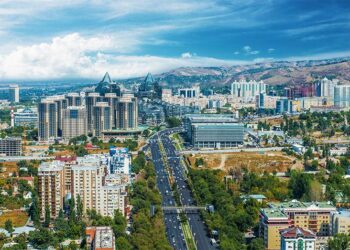Kazakhstan: Freedom on the Net 2024 Country Report – Freedom House
As the digital landscape continues to evolve, so too does the interplay between government control and citizen rights in cyberspace. Kazakhstan, a vast Central Asian nation that gained independence from the Soviet Union in 1991, finds itself at a critical juncture as it grapples with the complexities of internet freedom in an increasingly interconnected world. The Freedom house 2024 Country Report on Kazakhstan examines the current state of online liberties, highlighting notable challenges such as government surveillance, censorship, and the suppression of dissent. While the country has made strides in digital development and connectivity, the conflict between state authorities and advocates for free expression raises pressing questions about the future of freedom on the net. This article will delve into the key findings of the report,exploring the implications for civil society and the overarching impact on democracy in Kazakhstan.
Kazakhstans Digital Landscape: An Overview of Internet Freedom in 2024

Kazakhstan’s digital landscape in 2024 reflects a complex interplay between efforts to modernize its internet infrastructure and increasing government scrutiny over digital communications. The state continues to impose restrictions on internet freedom, characterized by a series of laws that empower authorities to monitor online activities and suppress dissent. Notable measures include:
- Surveillance Laws: Enhanced legal frameworks allow for greater surveillance of citizens’ online behaviour.
- Content Filtering: Increased filtering mechanisms target political dissent and social movements, limiting access to various platforms.
- Simplified Censorship Processes: Authorities can swiftly shut down websites, often with minimal transparency.
On the other hand,pockets of resistance and innovation persist,showcasing the resilience of digital rights advocates. Grassroots organizations and tech-savvy youths are pushing back against state control, promoting digital literacy and privacy awareness. Initiatives focusing on:
- Safe Browsing Tools: Development of VPN services and privacy-oriented browser extensions to circumvent censorship.
- Public Awareness Campaigns: Efforts to educate the public on their rights and the importance of internet freedom.
- International Collaborations: Partnerships with global non-profit organizations to foster a more open internet environment.
Censorship and Surveillance: The State of Online Expression in Kazakhstan

The landscape of online expression in Kazakhstan is increasingly characterized by systematic censorship and extensive surveillance measures implemented by the government. In 2023, authorities intensified their control over digital platforms, employing a range of tactics to suppress dissent and prevent the spread of information deemed politically sensitive.Key methods of censorship include:
- Blocking access to autonomous news websites and social media platforms.
- Implementing internet shutdowns during protests or significant political events.
- Monitoring online communications and activity of users, notably activists and opposition figures.
moreover, the pervasive surveillance mechanisms, coupled with stringent laws regulating online content, deter users from engaging in open discussions. Laws like the Law on Information and Communication Networks, enacted in previous years, permit the government to impose heavy fines on individuals for sharing “false” information, effectively chilling free expression.the lack of transparency surrounding these laws further complicates the situation. Despite the hurdles, civil society continues to find ways to navigate the restrictive digital environment, often utilizing privacy tools and anonymous platforms to communicate and mobilize for change. This ongoing struggle illustrates the resilience of Kazakh citizens in the face of growing authoritarianism.
The Role of Social Media: Platforms as Tools for Activism and Repression

In recent years, social media has emerged as a double-edged sword in Kazakhstan, serving both as a potent instrument for activism and a tool for governmental repression. Activists have harnessed platforms like Facebook,Instagram,and Telegram to mobilize supporters,spread awareness of human rights abuses,and organize peaceful protests. These digital arenas facilitate the rapid sharing of information, empowering citizens to circumvent traditional media constraints, which are often state-controlled. The ability to create and share content freely has led to significant grassroots movements, challenging the status quo and demanding accountability.
Though, the government has not remained passive in the face of this digital uprising. Authorities have implemented various tactics to suppress dissenting voices online, including arbitrary detentions, cyberattacks, and the selective blocking of social media platforms during periods of unrest. The following strategies illustrate how these platforms are utilized for both promotion and suppression in the digital landscape of Kazakhstan:
- Surveillance: Increased monitoring of social media activity to track potential dissent.
- Disinformation campaigns: State-sponsored narratives aimed at discrediting activists and misleading the public.
- Direct censorship: Blocking or throttling internet access to stifle mobilization efforts.
Recommendations for Improvement: Pathways to Enhance Digital Rights in Kazakhstan

To enhance digital rights in Kazakhstan, it is indeed crucial for stakeholders—including government bodies, civil society organizations, and the tech community—to work collaboratively on strategic initiatives. Emphasizing transparency in government actions related to internet governance can foster public trust. Initiatives could include:
- Establishing an independent oversight body to monitor internet freedom.
- Encouraging public participation through regular consultations with citizens on digital policy decisions.
- Implementing educational programs focused on digital literacy to empower individuals about their rights online.
Moreover, promoting a multi-stakeholder approach can support a more inclusive digital ecosystem. This can be achieved by strengthening partnerships between local and international organizations to share best practices in safeguarding digital rights. Actionable steps may involve:
- Organizing workshops and conferences to raise awareness on digital rights issues.
- Enhancing legal frameworks to protect against online surveillance and censorship.
- Encouraging technology companies to adopt ethical practices that prioritize user privacy and freedom of expression.
International Collaborations: The Impact of Global Partnerships on Freedom of the Net

International collaborations have played a crucial role in shaping the landscape of digital freedoms in Kazakhstan, particularly as the country navigates the complexities of maintaining its sovereignty while participating in global networks.Through partnerships with organizations advocating for human rights and digital freedoms, Kazakhstan has made strides toward increasing awareness about online surveillance, censorship, and human rights violations. these global alliances frequently enough bring together experts and activists who share resources and strategies, enabling local advocates to amplify their voices against repressive measures. moreover, collaborations with international entities can result in better policy-making processes by integrating global best practices that promote digital freedoms.
As Kazakhstan engages in international dialogues, it is indeed also vital to acknowledge the dual-edged nature of these partnerships. While they can support freedom of expression, there exists the risk of external influences that may not align with the country’s cultural and political context. Thus, it becomes essential to critically evaluate the frameworks of these collaborations to ensure that they do not inadvertently lead to greater control and surveillance under the guise of improving digital infrastructure. the balance between foreign investment in technology and the safeguard of citizens’ rights remains an ongoing challenge, underscoring the need for vigilant and informed advocacy within the international community.
Future Outlook
the “Freedom on the Net 2024 Country Report” from freedom House paints a complex picture of Kazakhstan’s digital landscape. While the government has made strides in expanding internet access and increasing connectivity, significant challenges persist in the realm of online freedom.The report highlights ongoing issues such as censorship, surveillance, and the harassment of activists and journalists, which serve as stark reminders of the fragility of digital liberties in the region. As Kazakhstan navigates its path towards greater integration into the global digital economy,understanding these dynamics will be crucial for policymakers,civil society,and the international community alike. The fight for a free and open internet in Kazakhstan is far from over, and continued vigilance will be essential to protect the rights of its citizens in an increasingly digital world.












